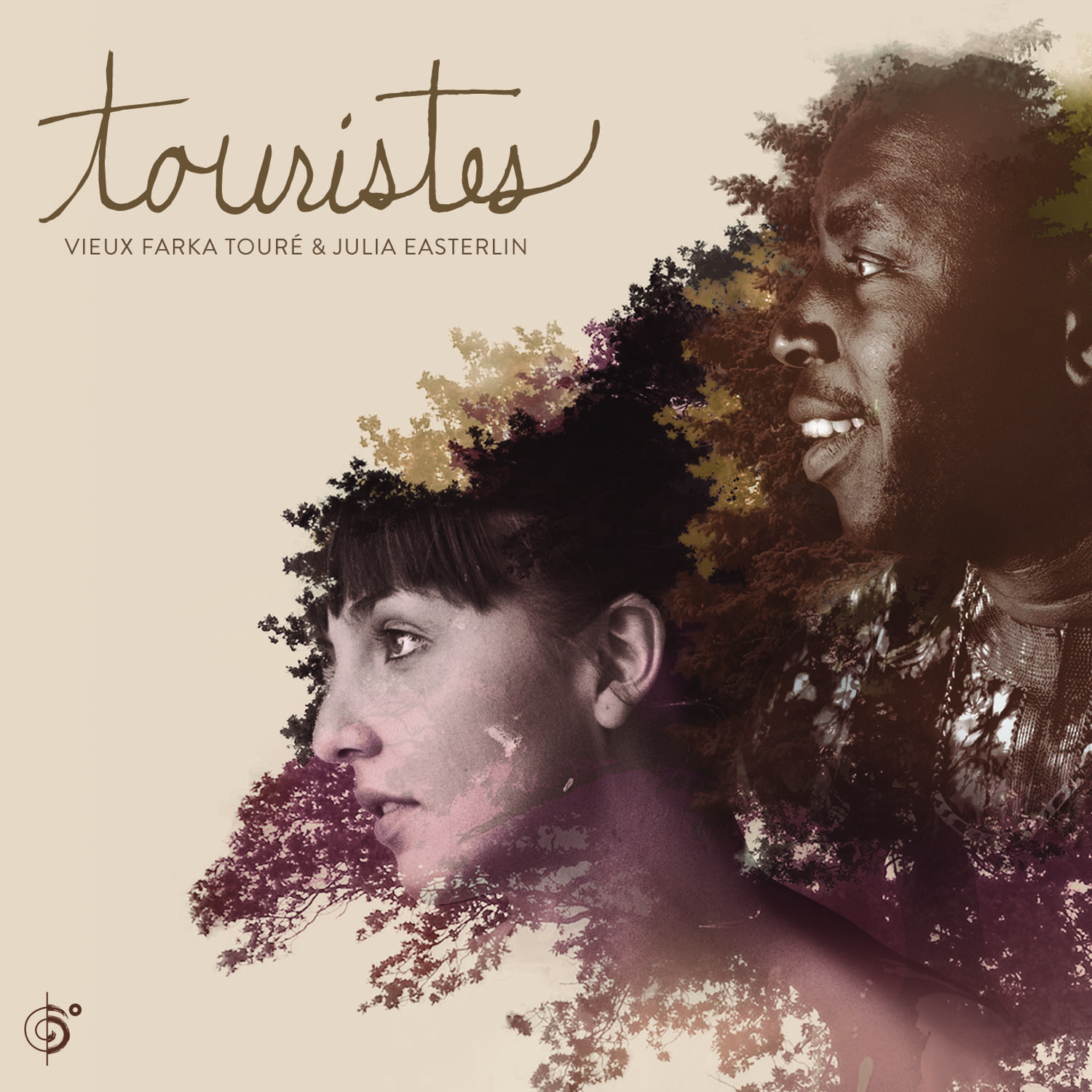
VIEUX FARKA TOURE AN JULIA EASTERLIN
Don’t be fooled by the title, Touristes. The famed Malian singer and guitarist Vieux Farka Touré, and the rising American singer and performance artist Julia Easterlin, both sound completely at home in this unexpected musical meeting. Touré is a genuinely global star, “the Hendrix of the Sahara,” whose music embraces the ancient desert blues of West Africa and the sounds of modern rock. Easterlin is Georgia-born and Brooklyn-based, and lives at the intersection of pop music and experimental songwriting. The two met in New York in 2014 and as Vieux recalls, “within about one or two hours we had created four songs together.” Written in a white-hot burst of inspiration, Touristes would ultimately feature six original songs, three startling covers – of songs from Bob Dylan, Fever Ray, and the Appalachian folk tradition – and one case of a new song built upon an old one.
The album begins with “Little Things,” a product of that first meeting. Julia Easterlin’s melody and lyrics are new, but they are built upon a classic West African song, “Kaira.” Both Vieux and his late father, the legendary blues guitarist Ali Farka Touré, have recorded “Kaira” before; this time, Vieux explains, “I played it in a bit of a new way on guitar, in my own style, and Julia began to improvise on top.” The lilting rhythm (a 4/4 with a heavy accent on the 3, for those keeping score at home) provides an intriguing fit for Julia’s looped vocals, a technique she uses to great effect in her own songs. In a voice that might recall Rickie Lee Jones or Edie Brickell, she sings, “I build a fortress, with the little things that I have saved.” And while Vieux’s acoustic guitar leads the way, wisps of ngoni (a Malian lute), wood flute and electric organ provide the musical equivalent of those little things that she has saved.
In some ways, the heart and soul of Touristes is the Touré/Easterlin cover of Bob Dylan’s “Masters of War.” This was, according to Vieux, the very first song the duo tried together. Dylan’s scathing lyrics are still there, but the slow, mournful arrangement gives the song a different flavor. For Vieux, from war-torn Mali, it meant a great deal: “On my last album, Mon Pays, (‘my country’) I was singing a lot about the need for peace and the evils of war. We in Mali are still suffering from the effects of war every day.” It was Julia’s idea to try the song; she feels it deeply as well. “I was pretty young – about 11 years old – when 9/11 occurred, and I lived near a military base in Georgia. From a young age, I saw how my friends’ families were wrecked by the decisions of those who will never have to stand in battle but who will send my generation’s young women and men to the front lines with apparent recklessness. These are the masters of war to whom I’m singing.”
And there it is: Touristes is not just a collection of pretty songs with an interesting backstory. It is an album about something – it is an album of ideas. On the song “Bamba Na Wili” – one of three featuring lead vocals by Touré – Vieux digs into the centuries-old tradition of “praise songs.” Over what sounds like New Orleans funk but which could just as easily be another old West African rhythms, he sings in a mix of Songhai and Peul; but you don’t need to know either language to pick out the name of Ali Farka Touré halfway through the song. Clearly, “Bamba Na Wili” is a song about family… but there’s a twist. “Ali’s mother came from Bamba,” Vieux explains, “which is a small village between Timbuktu and Gao. For us, people very often talk about the history of the men in the family but not the women. Bamba is the source of our family because it is the source of Ali’s mother and her family.” In another musical gesture shared by both the New Orleans and West African traditions, Julia provides a brief chorus of layered voices that functions almost like a horn section.

Julia’s vocals are front and center on “In The Pines,” the familiar Appalachian folk song. (You may know Nirvana’s version, under the alternate title “Where Did You Sleep Last Night.”) In this arrangement, Vieux’s acoustic guitar suggests it’s not such a big leap from Mali to Appalachia. The loping hand percussion and barely-sung lines add to the eeriness of this classic murder ballad. But the genius of choosing this song doesn’t become apparent until three minutes later, when Julia sings “Took My Brother Down.” Written in response to the police shooting of Michael Brown in Ferguson, Missouri, “Took My Brother Down” is a contemporary, urban murder ballad. The arrangement is totally Saharan: acoustic guitar, hand percussion, and commentary from the traditional njarka fiddle. But the song is completely and sadly current. “Sirens blaring… his hands were raised above his head,” Julia sings
Easterlin also finds herself asking questions like “Is it dark already?” and “Is it cold outside?” in the duo’s funky, Prince-inflected cover of “I’m Not Done,” a deep cut by Fever Ray of the hit Swedish group The Knife. The questions may be pensive but the answer is a bright affirmation from the guitar and horns and organ. An equally high-spirited track is “A B’ashiye” (“It’s Alright”), which finds Vieux in his more accustomed electric mode and singing in Bambara. The song sports a lilting rhythm and neat horn arrangement into which the electric guitar solo fits seamlessly. Julia provides a wordless vocal backdrop and then sings the title phrase in a classic bit of call-and-response with Vieux.
For the serious music fans, there is plenty to geek out about on Touristes: Vieux’s imposing guitar solo on “The World,” for example, or Julia’s horn-like vocal interjections on that same track. The way Vieux’s acoustic guitar recalls decades of rock, from 60s folk rock to today’s indie bands, without ever straying from his roots. And the way the muted trumpet and percussion drop out in the closing track “Apples And Champagne,” exposing Julia’s almost whispered vocals, in a farewell of sorts.
But Touristes is also the sound of two people – speaking different languages and representing two continents, two hemispheres – finding common ground. (And “touristes” is also a combination of Touré and Easterlin, Vieux points out.) Perhaps Vieux Farka Touré and Julia Easterlin were just visiting. But this album leaves us hoping that they’ll be back.
Albums

